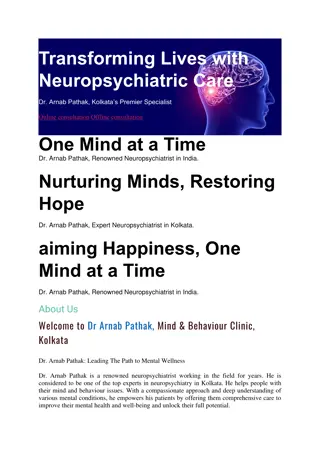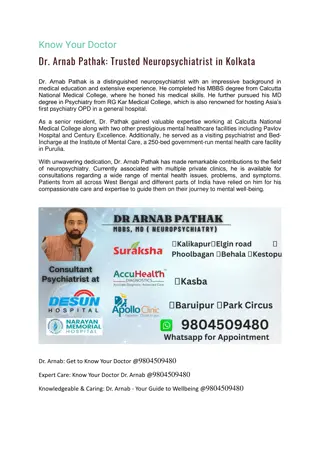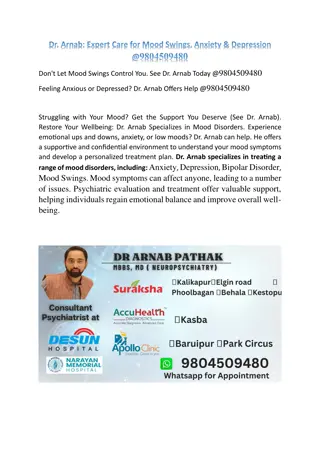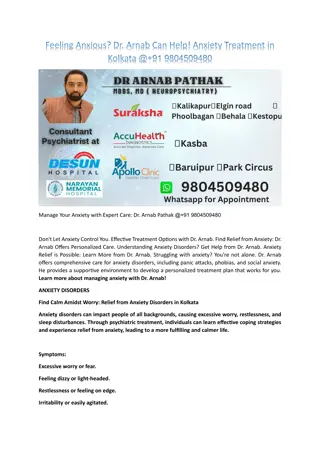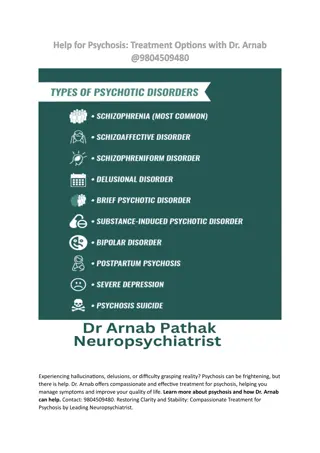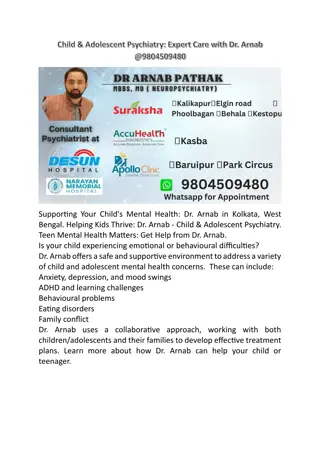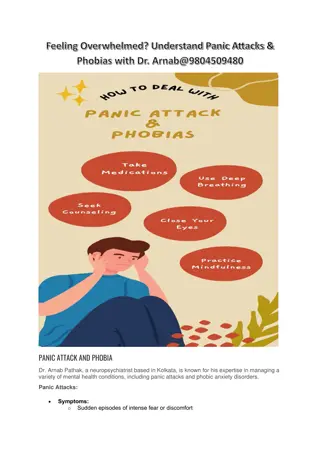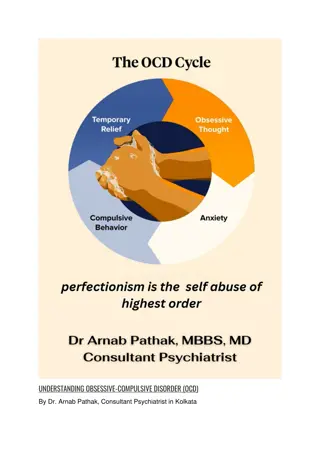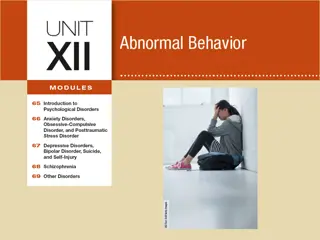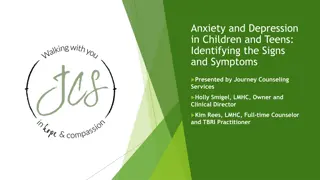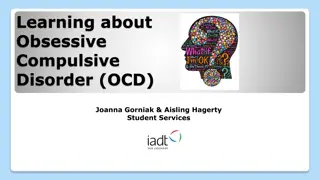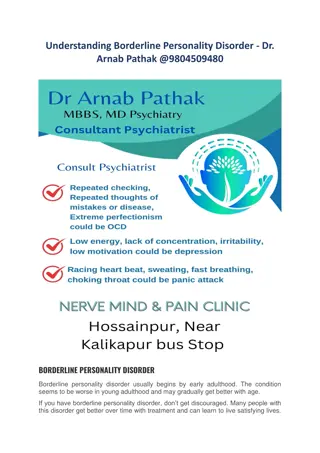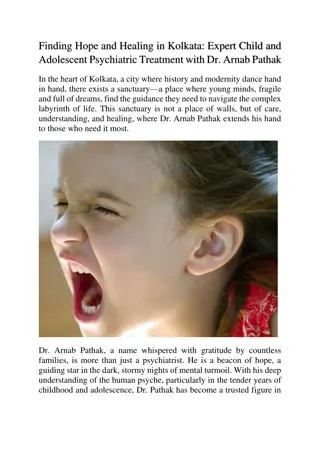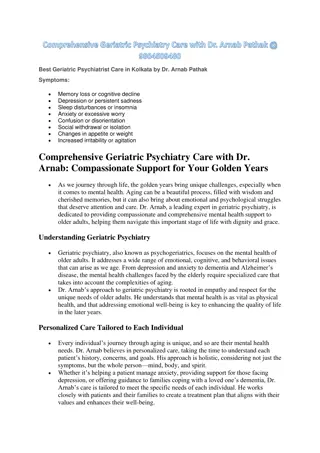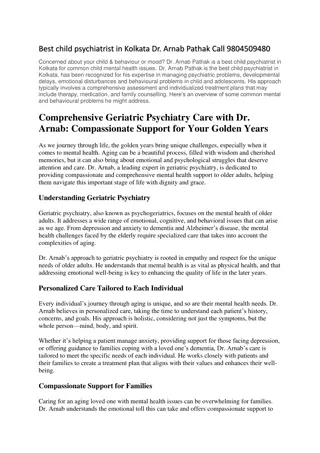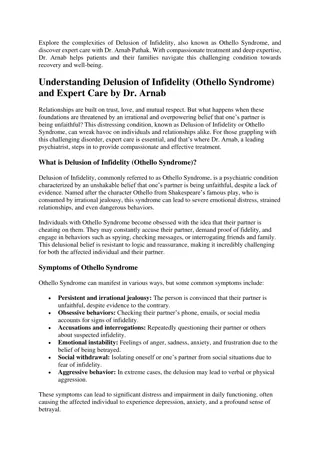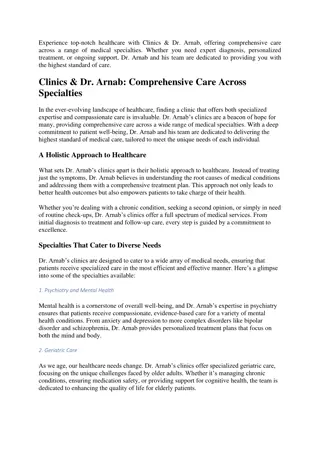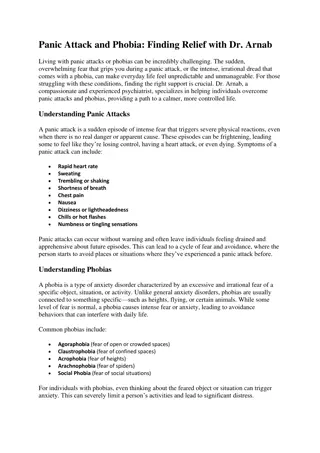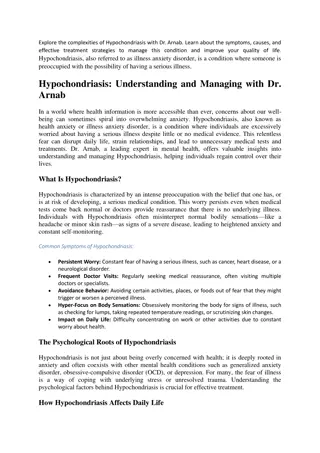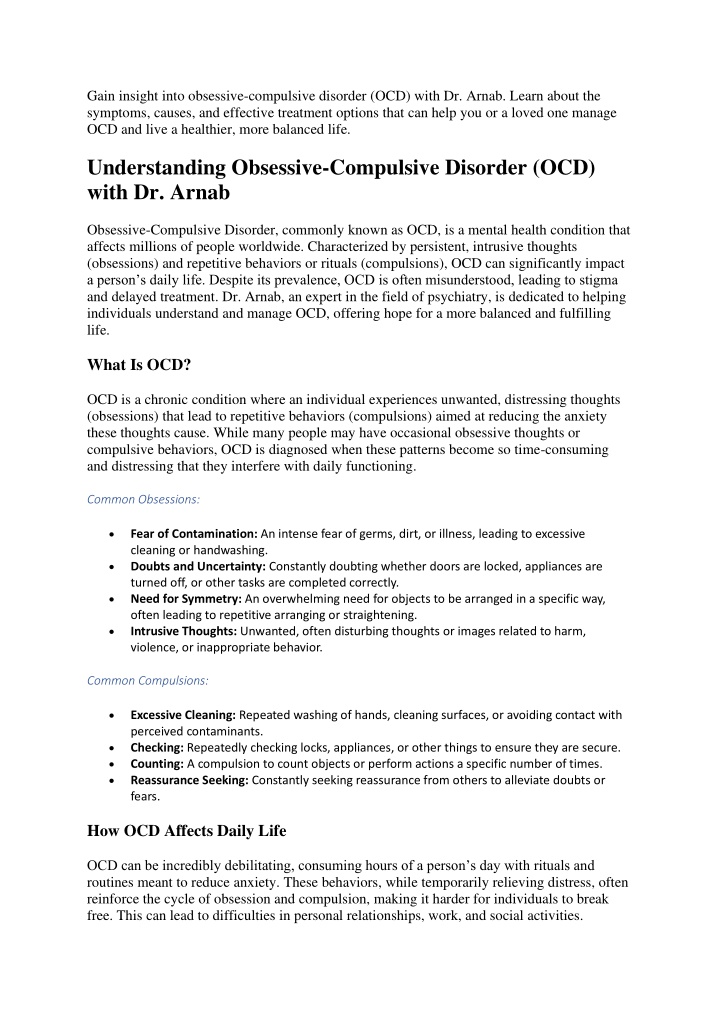
Understanding Obsessive-Compulsive Disorder (OCD) with Dr Arnab
Gain insight into obsessive-compulsive disorder (OCD) with Dr. Arnab. Learn about the symptoms, causes, and effective treatment options that can help you or a loved one manage OCD and live a healthier, more balanced life.nContact us today and step i
Download Presentation

Please find below an Image/Link to download the presentation.
The content on the website is provided AS IS for your information and personal use only. It may not be sold, licensed, or shared on other websites without obtaining consent from the author. If you encounter any issues during the download, it is possible that the publisher has removed the file from their server.
You are allowed to download the files provided on this website for personal or commercial use, subject to the condition that they are used lawfully. All files are the property of their respective owners.
The content on the website is provided AS IS for your information and personal use only. It may not be sold, licensed, or shared on other websites without obtaining consent from the author.
E N D
Presentation Transcript
Gain insight into obsessive-compulsive disorder (OCD) with Dr. Arnab. Learn about the symptoms, causes, and effective treatment options that can help you or a loved one manage OCD and live a healthier, more balanced life. Understanding Obsessive-Compulsive Disorder (OCD) with Dr. Arnab Obsessive-Compulsive Disorder, commonly known as OCD, is a mental health condition that affects millions of people worldwide. Characterized by persistent, intrusive thoughts (obsessions) and repetitive behaviors or rituals (compulsions), OCD can significantly impact a person s daily life. Despite its prevalence, OCD is often misunderstood, leading to stigma and delayed treatment. Dr. Arnab, an expert in the field of psychiatry, is dedicated to helping individuals understand and manage OCD, offering hope for a more balanced and fulfilling life. What Is OCD? OCD is a chronic condition where an individual experiences unwanted, distressing thoughts (obsessions) that lead to repetitive behaviors (compulsions) aimed at reducing the anxiety these thoughts cause. While many people may have occasional obsessive thoughts or compulsive behaviors, OCD is diagnosed when these patterns become so time-consuming and distressing that they interfere with daily functioning. Common Obsessions: Fear of Contamination: An intense fear of germs, dirt, or illness, leading to excessive cleaning or handwashing. Doubts and Uncertainty: Constantly doubting whether doors are locked, appliances are turned off, or other tasks are completed correctly. Need for Symmetry: An overwhelming need for objects to be arranged in a specific way, often leading to repetitive arranging or straightening. Intrusive Thoughts: Unwanted, often disturbing thoughts or images related to harm, violence, or inappropriate behavior. Common Compulsions: Excessive Cleaning: Repeated washing of hands, cleaning surfaces, or avoiding contact with perceived contaminants. Checking: Repeatedly checking locks, appliances, or other things to ensure they are secure. Counting: A compulsion to count objects or perform actions a specific number of times. Reassurance Seeking: Constantly seeking reassurance from others to alleviate doubts or fears. How OCD Affects Daily Life OCD can be incredibly debilitating, consuming hours of a person s day with rituals and routines meant to reduce anxiety. These behaviors, while temporarily relieving distress, often reinforce the cycle of obsession and compulsion, making it harder for individuals to break free. This can lead to difficulties in personal relationships, work, and social activities.
For example, someone with a fear of contamination might spend hours each day washing their hands, avoiding social interactions, or isolating themselves to prevent contact with germs. Similarly, a person with checking compulsions might be late to work because they spend excessive time ensuring that every door is locked and appliance is turned off before leaving the house. The Importance of Early Intervention Early intervention is key to managing OCD effectively. Unfortunately, many people with OCD delay seeking help due to stigma or a lack of understanding about the disorder. It s important to recognize that OCD is a medical condition, not a character flaw or something that can be easily controlled through willpower alone. Dr. Arnab emphasizes the importance of reaching out for professional help if you or a loved one is struggling with OCD symptoms. With the right treatment and support, individuals can learn to manage their symptoms and improve their quality of life. Treatment Options for OCD Treatment for OCD typically involves a combination of therapy, medication, and support. Dr. Arnab is experienced in providing comprehensive, evidence-based treatment plans tailored to each individual s needs. 1. Cognitive Behavioral Therapy (CBT): CBT is the most effective form of therapy for OCD. It focuses on changing the thought patterns that trigger obsessive behaviors and teaching coping strategies to manage anxiety. A specific type of CBT known as Exposure and Response Prevention (ERP) is particularly effective for treating OCD. ERP involves gradually exposing individuals to their fears without allowing them to engage in compulsive behaviors, helping them build tolerance to anxiety and reduce the urge to perform rituals. 2. Medication: Selective serotonin reuptake inhibitors (SSRIs), a type of antidepressant, are commonly prescribed to help manage OCD symptoms. These medications can help reduce the intensity of obsessions and compulsions, making it easier for individuals to engage in therapy and make progress in their treatment. 3. Supportive Care: Support from family, friends, and support groups can be invaluable for those with OCD. Dr. Arnab encourages involving loved ones in the treatment process, providing education about the disorder and strategies for supporting someone with OCD. Support groups also offer a space where individuals can share their experiences and connect with others who understand what they re going through. Living Well with OCD
Living with OCD can be challenging, but with the right treatment and support, it is possible to manage the symptoms and lead a fulfilling life. Dr. Arnab works closely with his patients to develop personalized treatment plans that address their unique needs and goals. Through a combination of therapy, medication, and ongoing support, individuals with OCD can regain control over their lives and reduce the impact of the disorder on their daily activities. Conclusion: Take the First Step Towards Relief If you or someone you know is struggling with OCD, it s important to seek help from a qualified mental health professional. Dr. Arnab is dedicated to helping individuals understand and manage OCD, providing compassionate, expert care that can make a significant difference in their lives. Don t let OCD control your life. Take the first step towards understanding and managing your symptoms by reaching out to Dr. Arnab today. With the right support, you can overcome the challenges of OCD and achieve a more balanced, peaceful life. Contact us today and step into the serene embrace of Dr. Arnab Pathak s care. 9804509480 Accuhealth diagnostic, sandhyadeep 16/A, Gold Park Road Rajdanga Kolkata, West Bengal 700107 India Mail: arnab.pathak@gmail.com https://drarnabpathak.in/understanding-obsessive-compulsive-disorder-ocd/

